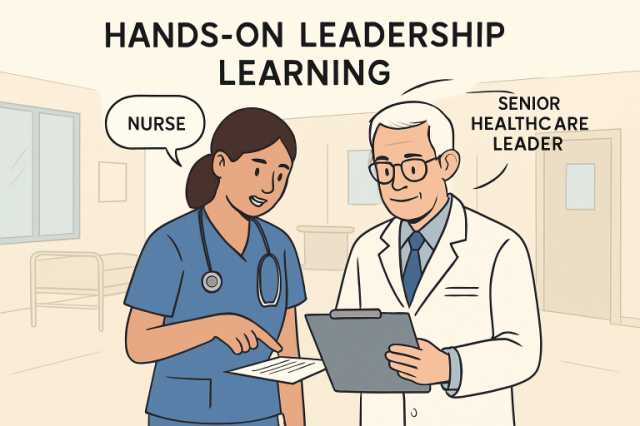Key Takeaways
- Practicums turn classroom knowledge into hands-on leadership experience.
- Students develop skills in strategic planning, decision-making, and quality improvement.
- Networking with experienced nurse leaders supports career growth.
- Progressive stages build confidence and competence in executive roles.
- Real-world projects prepare students to lead and innovate in healthcare organizations.
Introduction
As healthcare becomes increasingly complex and multifaceted, the need for skilled nurse leaders has never been greater. Master of Science in Nursing (MSN) Nurse Executive programs have emerged as a pathway for registered nurses to advance into high-impact leadership positions, shaping organizational excellence and patient outcomes from the top down. A cornerstone of these advanced programs is the practicum experience—a hands-on, immersive learning component that bridges academic theory with leadership practice in real-world clinical settings. For those seeking flexibility in their education, an online MSN program often incorporates these valuable practicum components alongside virtual coursework, providing a comprehensive and convenient option for working professionals.
The mission of an MSN Nurse Executive program is to develop competencies that extend well beyond clinical expertise. The practicum serves as a laboratory for students to translate knowledge gained in the classroom into action, making it an irreplaceable step toward operational leadership. Through direct exposure to the challenges and rewards of healthcare administration, students learn how to drive quality initiatives, manage multidisciplinary teams, and impact health system outcomes on a broad scale.
Understanding the Practicum Component
Practicum experiences in MSN Nurse Executive programs are characterized by supervised, structured learning within healthcare organizations, such as hospitals, clinics, or administrative offices. Northwest Missouri State University highlights that under the mentorship of seasoned nurse leaders, students gain opportunities to observe, participate in, and eventually lead activities spanning management, operations, and patient care quality improvement.
Key aspects include exposure to leadership theories applied in real time, direct involvement in decision-making and change management processes, and the execution of evidence-based practice projects designed to improve clinical or operational outcomes. These authentic experiences enhance readiness for executive roles and nurture professional relationships with mentors and colleagues in the field.
By engaging with diverse teams and organizational styles, students gain a deeper appreciation of workforce dynamics, regulatory requirements, and the ethical frameworks that underpin modern nursing leadership. This exposure is essential for developing adaptive leaders who can effectively respond to the evolving needs of healthcare systems.
Benefits of Practicum Experiences
- Skill Development: Students refine critical leadership skills, such as strategic planning, resource allocation, and evidence-based decision-making—capabilities that are indispensable to effective healthcare management.
- Professional Networking: Practicums facilitate direct engagement with experienced nurse executives, fostering connections that can lead to mentorship, references, or career advancement opportunities.
- Confidence Building: Encountering and resolving real-world challenges under the supervision of established leaders empowers students to approach complex scenarios with increased assurance and clarity.
Experiential learning through practicums also enhances self-awareness and emotional intelligence, vital for transforming organizations and advocating for patients, families, and staff.
Structure of Practicum Experiences
To maximize learning, MSN Nurse Executive practicums are generally structured in progressive phases:
- Initial Stage: This phase emphasizes orientation to organizational culture, mission, workflow, and observation of various leadership and management functions within the host facility.
- Intermediate Stage: Building on an initial understanding, students assume responsibility for select managerial tasks and contribute to system-based quality improvement initiatives.
- Advanced Stage: In the final phase, students—under close supervision—may spearhead a leadership project, participate in strategic planning, or lead interdisciplinary teams in driving organizational change.
Thoughtful integration of these stages allows students to gradually build their capabilities, ensuring a seamless transition from observer to active participant and leader by the end of the practicum.
Challenges and Solutions
While practicum experiences are invaluable, they bring challenges such as time constraints imposed by balancing coursework, employment, and family obligations. Navigating unfamiliar organizational cultures or clashing with established workflows can also be daunting. Overcoming these obstacles requires effective time management, continuous communication with preceptors and faculty advisors, and proactive engagement in learning opportunities.
Real-World Applications
The impact of practicum learning is evident in transformative projects led by nurse executive students. For example, a candidate may design and implement a program to streamline patient admissions and reduce wait times, using data analytics and continuous quality improvement cycles to measure success and make adjustments. Others may guide teams through change management initiatives, such as introducing new technologies or care delivery models.
By the conclusion of the practicum, students emerge with a robust portfolio of accomplishments and firsthand leadership experiences, making them more attractive to prospective employers and better equipped to deliver strategic value in executive roles.
Final Thoughts
Practicum experiences form the heart of MSN Nurse Executive education, bridging the distance between classroom theory and cutting-edge practice. They cultivate leadership excellence, foster vital professional connections, and empower nurses with the skills to optimize healthcare delivery. For nurses aspiring to effect change and lead with distinction, the practicum is a transformative step toward executive leadership.






